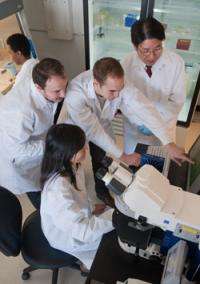Addressing the challenge of persister cells in bacterial infections

Dacheng Ren, assistant professor in the Department of Biomedical and Chemical Engineering in Syracuse University’s L.C. Smith College of Engineering and Computer Science (LCS) and member of the Syracuse Biomaterials Institute, has published a paper based on his research into how antimicrobial peptides may be able to aid in addressing the challenge posed by bacterial persister cells. His work was published in the July issue of Applied and Environmental Microbiology.
Persister cells, similar to spores, are a small portion of a microbial population that is dormant. Inherent in bacterial populations, it is believed that they play important roles in chronic infections like tuberculosis, persistent fungal infections and lung infections in cystic fibrosis patients. The dormant properties of these persister cells make them tolerant to almost all antibiotics. Therefore, infections can reoccur once a person stops antibiotic treatment since the bacteria can regrow from the persister cells and attack again.
Currently, there are no clinically proven treatments for killing persister cells. Working with New York University chemistry professor Neville R. Kallenbach, Ren began looking at anti-microbial peptides (AMP) as a potential solution to targeting these cells. AMPs target cells regardless of whether they are dormant, and Ren was able to demonstrate that some AMPs are very effective at attacking persister cells, both the free-swimming ones and those attached to surfaces (in biofilms).
The team also found a synergy between the use of antibiotics and AMPs to effectively eliminate dormant persister cells. Ren found that the use of AMPs reduced persister cells’ tolerance to antibiotic treatment. “We are inspired by these results and encouraged about potential new approaches to control persistent infections,” says Ren.
Provided by Syracuse University
















